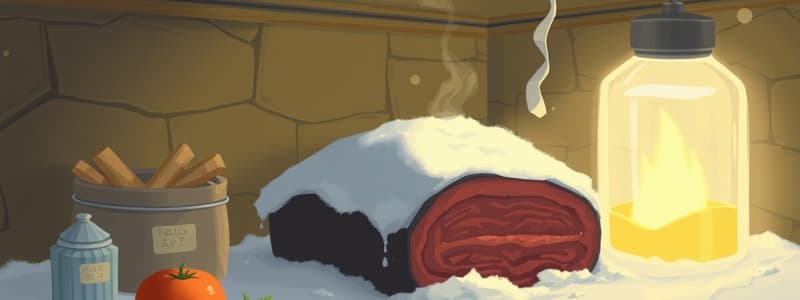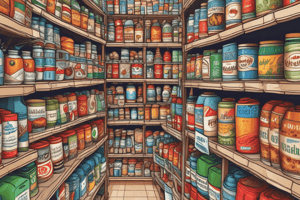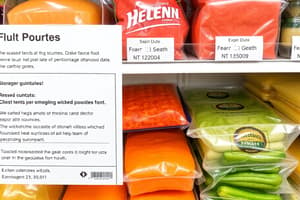Podcast
Questions and Answers
How far off the floor does food need to be stored?
How far off the floor does food need to be stored?
6 inches
What temperature should a freezer be set at?
What temperature should a freezer be set at?
0 degrees
Why is condensation in the walk-in a workplace hazard?
Why is condensation in the walk-in a workplace hazard?
Bacteria
What are 2 acceptable methods for thawing frozen foods?
What are 2 acceptable methods for thawing frozen foods?
When should foods be removed from sinks when using running water to thaw?
When should foods be removed from sinks when using running water to thaw?
Both raw and cooked foods can be thawed in the same sinks.
Both raw and cooked foods can be thawed in the same sinks.
What temperature should the walk-in be?
What temperature should the walk-in be?
How should food be stored to avoid cross-contamination?
How should food be stored to avoid cross-contamination?
What temperature should previously cooked foods be reheated to?
What temperature should previously cooked foods be reheated to?
What is the food temperature danger zone?
What is the food temperature danger zone?
When should food production utensils be cleaned and sanitized?
When should food production utensils be cleaned and sanitized?
If a can opener blade becomes worn, pieces can chip into food.
If a can opener blade becomes worn, pieces can chip into food.
What temperature should the food be stored at in a reach-in?
What temperature should the food be stored at in a reach-in?
Storing raw food over cooked food can cause cross-contamination.
Storing raw food over cooked food can cause cross-contamination.
It is better to reheat large amounts of food at one time rather than reheating small batches.
It is better to reheat large amounts of food at one time rather than reheating small batches.
What is the appropriate range to hold our soup?
What is the appropriate range to hold our soup?
Who should wear gloves in the restaurant?
Who should wear gloves in the restaurant?
How often should the line be re-iced?
How often should the line be re-iced?
How often should aprons be changed?
How often should aprons be changed?
What is the proper way to sanitize?
What is the proper way to sanitize?
Flashcards are hidden until you start studying
Study Notes
Food Storage and Safety Practices
- Foods must be stored at least 6 inches off the floor to ensure cleanliness and safety.
- A freezer should be set at 0 degrees Fahrenheit to properly freeze food and prevent spoilage.
- Walk-in refrigeration should be maintained at 41 degrees Fahrenheit for food safety.
- Proper food storage involves keeping cooked foods above raw foods to avoid cross-contamination.
Thawing and Reheating Guidelines
- Acceptable methods for thawing frozen foods include using cold water or refrigeration.
- Foods must be removed from running water when completely thawed to avoid temperature fluctuations.
- It is critical to never thaw raw and cooked foods in the same sink to prevent cross-contamination.
- Previously cooked foods need to be reheated to an internal temperature of 165 degrees Fahrenheit.
Temperature Control and Safety Zones
- The food temperature danger zone is defined as 40 to 140 degrees Fahrenheit, where bacteria can grow rapidly.
- Soup should be held at appropriate serving temperatures between 170 to 180 degrees Fahrenheit.
Cleaning and Sanitization Protocols
- Food production utensils must be cleaned and sanitized after each use to reduce the risk of foodborne illnesses.
- Proper sanitization involves a three-step process: wash, rinse, and sanitize.
Equipment and Personal Hygiene
- A worn can opener blade can chip into food, posing serious health risks; maintenance is crucial.
- Employees handling ready-to-eat food are required to wear gloves for hygiene.
- The ice line in food preparation areas should be re-iced hourly to maintain food safety temperatures.
Handling Practices
- Aprons should be changed whenever they become dirty to maintain cleanliness in food preparation areas.
- Reheating should be done in small batches rather than large quantities to ensure even heating and food safety.
Important Safety True/False Statements
- Both raw and cooked foods being thawed in the same sink is false due to cross-contamination risks.
- Storing raw food over cooked food is true and can lead to cross-contamination issues.
Studying That Suits You
Use AI to generate personalized quizzes and flashcards to suit your learning preferences.




